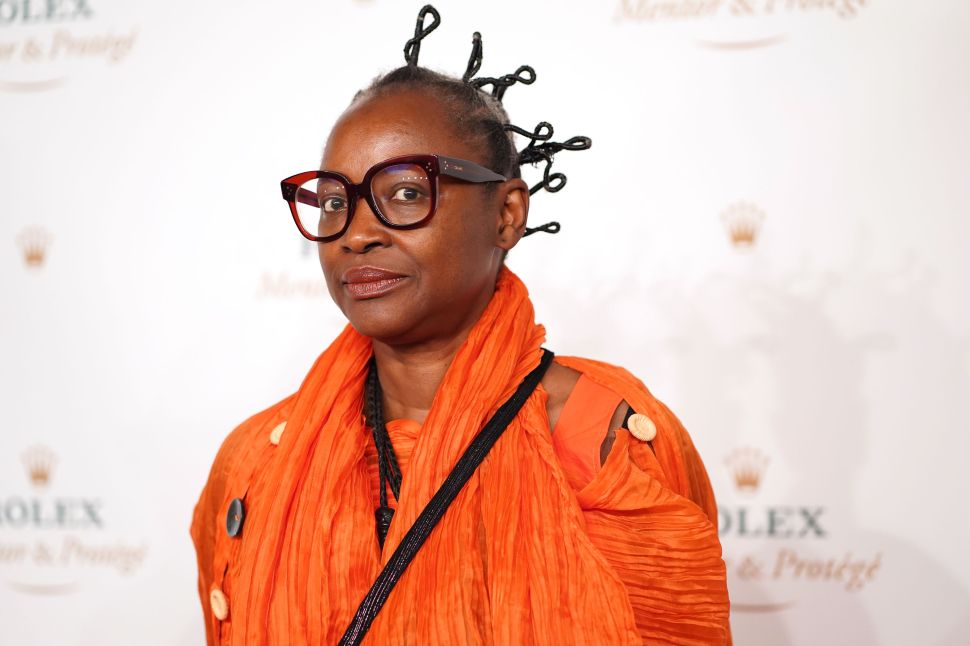Koyo Kouoh wearing a bright orange pleated garment and oversized red glasses, with her hair styled in sculptural twists, standing in front of a white backdrop featuring the Rolex logo.” width=”970″ height=”647″ data-caption=’Curator Koyo Kouoh passed away on May 10, 2025. <span class=”lazyload media-credit”>Patrick McMullan via Getty Image</span>’>
Announced as curator of the 2026 Venice Biennale last December, Koyo Kouoh passed away suddenly on May 10, leaving the organization—and the entire art world—in shock. Set to become the first African woman to curate the Biennale, Kouoh died at just 57 from a recently discovered cancer, as revealed by her husband Philippe Mall, just days before she was scheduled to debut the title and theme of next year’s edition.
Since her appointment, the internationally acclaimed curator had notably stepped back from public view, offering few statements or interviews—signs, perhaps, that something was amiss. Her death, just a year before what is arguably the art world’s most significant and complex exhibition, raises urgent questions about the future of the event. Will the Biennale be postponed? Or will a new curator be tasked with carrying forward Kouoh’s vision—or hastily conceiving an entirely new one—in under twelve months?
As the Biennale organization is currently focused on the opening of the Venice Architecture Biennale late last week, it has yet to comment on how Kouoh’s death will affect the 2026 exhibition, which, as of now, is still scheduled to open May 9, 2026.
SEE ALSO: As NEA Cuts Hit Hard, Arts Groups Are Readying Their Fundraising Pitches
The Cameroonian curator had built an internationally lauded career marked by institutional transformation and landmark exhibitions. When she joined Cape Town’s Zeitz Museum of Contemporary Art Africa (Zeitz MOCAA) as director and chief curator, the museum was navigating financial and strategic uncertainty; under her leadership, its programming and global relevance were powerfully revived. With a life and career spanning Cape Town, Dakar and Basel, Kouoh contributed to major international exhibitions including Documenta 12 and 13 in Kassel and organized pivotal shows such as “Still (the) Barbarians” for the 37th EVA International in Limerick in 2016 and “Body Talk: Feminism, Sexuality and the Body in the Works of Six African Women Artists” at WIELS in Brussels in 2015. From 2013 to 2017, she also curated the artistic program for the inaugural edition of 1-54 Contemporary African Art Fair in London, and she spearheaded the landmark 2022/2024 exhibition “When We See Us: A Century of Black Figuration in Painting,” which was the largest and most comprehensive exploration of Black self-representation, cultural expression and history to date, further solidifying her role as a champion of artists from Africa and the diaspora.
In 2008, Kouoh co-founded Raw Material Company, a Dakar-based art center focused on curatorial practice and art criticism, which remains a vital force in supporting the local art ecosystem by engaging literature, film, fashion and architecture. Beyond institutional leadership, she played a critical role in framing and developing the careers of artists such as Abdoulaye Konaté, Otobong Nkanga, Johannes Phokela and Tracey Rose, for whom she curated a first major monograph.
Notably, Kouoh once said she never imagined she would become a figure in the art world. Born in 1967 in Douala, Cameroon’s economic capital, she moved to Switzerland at 13 and initially studied business administration and banking. Though seemingly on track for a career at Credit Suisse, she began working with migrant women as a social worker. Her commitment to cultural expression and social change deepened upon returning to Africa, where she launched her curatorial career by coordinating cultural programs at the Gorée Institute in Senegal from 1998 to 2002.
Raw Material Company began as a mobile platform for critical exchange and artistic practice and established a permanent space in midtown Dakar in 2011. The center continues to serve as a locus for cross-disciplinary engagement across art, literature, architecture, fashion and film.
Kouoh remained committed throughout her career to dismantling reductive narratives surrounding African art. She advocated instead for a global perspective untethered from geographic or cultural essentialism. “I have grown beyond the idea of Africa as a geographical region,” she said in a 2014 interview with Ocula, “and rather, treat it as a mindset to give it a mental space that can be inhabited by anyone interested in the idea of Africa.” While her interests were never confined by national origin, she felt a deep responsibility to engage with what relates to Africa.
This mindset underscored her approach to curating: one rooted in nuance, complexity and transnational dialogue. That same framework was expected to shape her vision for the 61st Venice Biennale, which would have unfolded against a shifting global backdrop—beyond the binary of Global North and South. In a press statement, the Biennale organization described her passing as leaving “an immense void in the world of contemporary art and in the international community of artists, curators and scholars who had the privilege of knowing and admiring her extraordinary human and intellectual commitment.”

